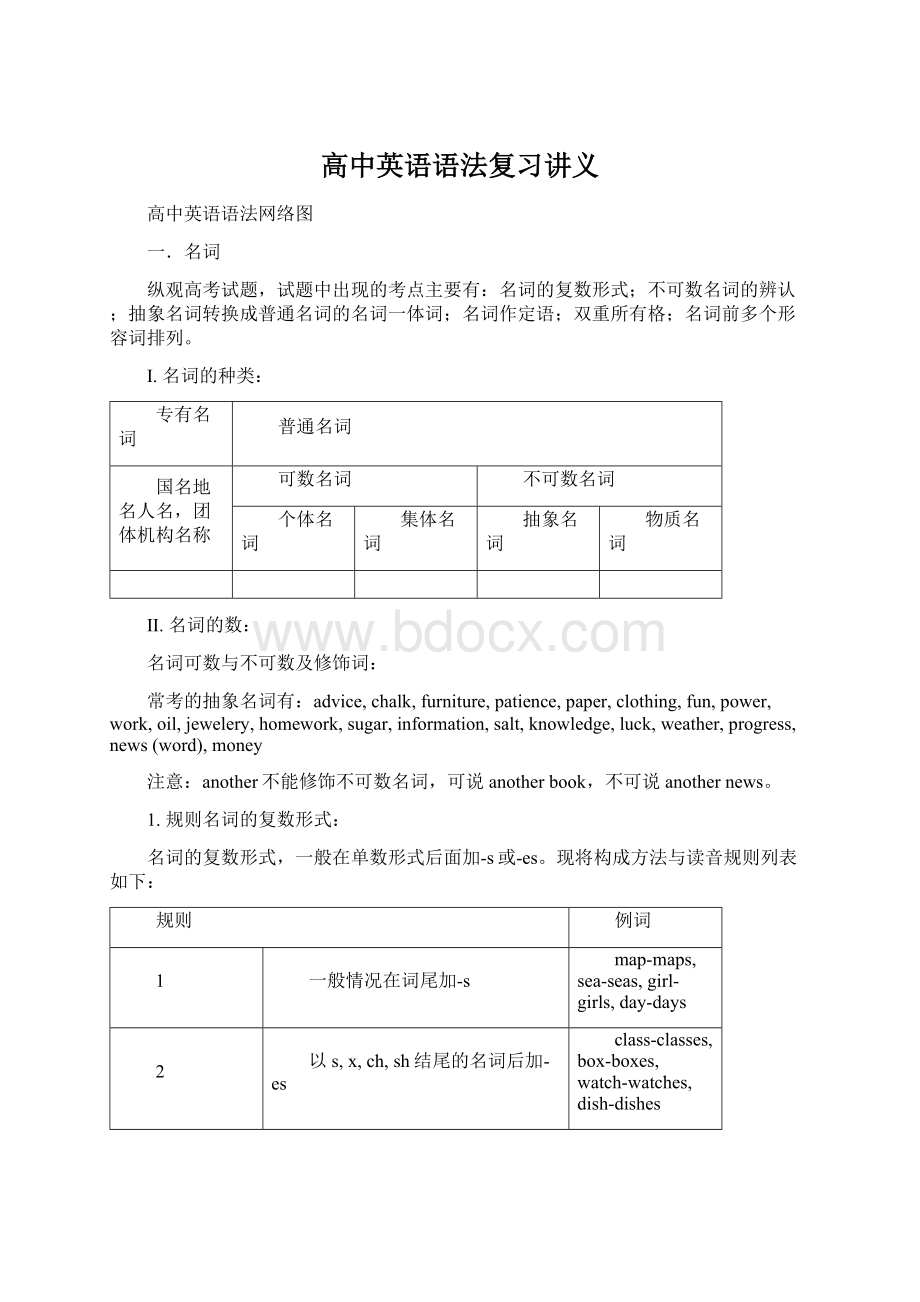高中英语语法复习讲义.docx
《高中英语语法复习讲义.docx》由会员分享,可在线阅读,更多相关《高中英语语法复习讲义.docx(105页珍藏版)》请在冰豆网上搜索。

高中英语语法复习讲义
高中英语语法网络图
一.名词
纵观高考试题,试题中出现的考点主要有:
名词的复数形式;不可数名词的辨认;抽象名词转换成普通名词的名词一体词;名词作定语;双重所有格;名词前多个形容词排列。
I.名词的种类:
专有名词
普通名词
国名地名人名,团体机构名称
可数名词
不可数名词
个体名词
集体名词
抽象名词
物质名词
II.名词的数:
名词可数与不可数及修饰词:
常考的抽象名词有:
advice,chalk,furniture,patience,paper,clothing,fun,power,work,oil,jewelery,homework,sugar,information,salt,knowledge,luck,weather,progress,news(word),money
注意:
another不能修饰不可数名词,可说anotherbook,不可说anothernews。
1.规则名词的复数形式:
名词的复数形式,一般在单数形式后面加-s或-es。
现将构成方法与读音规则列表如下:
规则
例词
1
一般情况在词尾加-s
map-maps,sea-seas,girl-girls,day-days
2
以s,x,ch,sh结尾的名词后加-es
class-classes,box-boxes,watch-watches,dish-dishes
3
以-f或-fe结尾的词
变-f和-fe为v再加-es
leaf-leaves,thief-thieves,knife-knives,loaf-loaves,wife-wives
加-s
belief-beliefs,chief-chiefs,proof-proofs,roof-roofs,gulf-gulfs
4
以辅音字母加y结尾的名词,变y为i加-es
party-parties,family-families,story-stories,city-cities
5
以元音字母加y结尾的名词,或专有名词以y结尾的,加-s
toy-toys,boy-boys,day-days,ray-rays,Henry-Henrys
6
以辅音字母加-o结尾的名词
一般加-es
hero-heroes,Negro-Negroes,potato-potatoes,tomato-tomatoes
不少外来词加-s
piano-pianos,photo-photos,auto-autos,kilo-kilos,solo-solos
两者皆可
zero-zeros/zeroes,volcano-volcanoes/volcanos
7
以元音字母加-o结尾的名词加-s
radio-radios,bamboo-bamboos,zoo-zoos
8
以-th结尾的名词加-s
truth-truths,mouth-mouths,month-months,path-paths,
2.不规则名词复数:
英语里有些名词的复数形式是不规则的,现归纳如下:
规则
例词
1
改变名词中的元音字母或其他形式
man-men,woman-women,foot-feet,goose-geese,mouse-mice
2
单复数相同
sheep,deer,series,means,works,fish,speciesli,yuan,jin,
3
只有复数形式
ashes,trousers,clothes,thanks,goods,glasses,compasses,contents
4
一些集体名词总是用作复数
people,police,cattle,staff
5
部分集体名词既可以作单数(整体)也可以作复数(成员)
audience,class,family,crowd,couple,group,committee,government,population,crew,team,public,enemy,party
6
复数形式表示特别含义
customs(海关),forces(军队),times(时代),spirits(情绪),drinks(饮料),sands(沙滩),papers(文件报纸),manners(礼貌),looks(外表),brains(头脑智力),greens(青菜),ruins(废墟)
7
表示“某国人”
加-s
Americans,Australians,Germans,Greeks,Swedes,Europeans
单复数同形
Swiss,Portuguese,Chinese,Japanese
以-man或-woman结尾的改为-men,-women
Englishmen,Frenchwomen
8
合成名词
将主体名词变为复数
sons-in-law,lookers-on,passers-by,story-tellers,boyfriends
无主体名词时将最后一部分变为复数
grown-ups,housewives,stopwatches
将两部分变为复数
womensingers,menservants
III.名词的所有格:
名词在句中表示所有关系的语法形式叫做名词所有格。
所有格分两种:
一是名词词尾加’s构成,二是由介词of加名词构成。
前者多表示有生命的东西,后者多表示无生命的东西。
1.’s所有格的构成:
单数名词在末尾加’s
theboy’sfather,Jack’sbook,herson-in-law’sphoto,
复数名词
一般在末尾加’
theteachers’room,thetwins’mother,
不规则复数名词后加’s
thechildren’stoys,women’srights,
以s结尾的人名所有格加’s或者’
Dickens’novels,Charles’sjob,theSmiths’house
表示各自的所有关系时,各名词末尾均须加’s
Japan’sandAmerica’sproblems,Jane’sandMary’sbikes
表示共有的所有关系时在最后一词末加’s
JapanandAmerica’sproblems,JaneandMary’sfather
表示"某人家""店铺",所有格后名词省略
thedoctor’s,thebarber’s,thetailor’s,myuncle’s
2.’s所有格的用法:
1
表示时间
today’snewspaper,fiveweeks’holiday
2
表示自然现象
theearth’satmosphere,thetree’sbranches
3
表示国家城市等地方的名词
thecountry’splan,theworld’spopulation,China’sindustry
4
表示工作群体
theship’screw,majority’sview,theteam’svictory
5
表示度量衡及价值
amile’sjourney,fivedollars’worthofapples
6
与人类活动有特殊关系的名词
thelife’stime,theplay’splot
7
某些固定词组
abird’seyeview,astone’sthrow,atone’swit’send(不知所措)
3.of所有格的用法:
用于无生命的东西:
thelegsofthechair,thecoverofthebook
用于有生命的东西,尤其是有较长定语时:
theclassroomsofthefirst-yearstudents
用于名词化的词:
thestruggleoftheoppressed
四几个容易误用的名词的单复数:
1.单复数相同:
sheep,deer,fish,Chinese,Japanese,means,works
2.只有复数:
cattle,people
3.常以复数形式出现:
trousers,glasses,thanks,clothes,remains(遗物),contents,goods,congratulations,means,sports,preparations(准备),tears,repairs,regards,games(运动会)
4.以s结尾的学科或专有名词常作单数:
politics,maths,physics,theUnitedStates,TheUnitedNations
五、几组易错名词的用法:
1.manya+单数名词=many+复数名词
2.集合名词:
family,team,audience,enemy,public,group,class,government,company,police,party
作主语时,若看作一个整体时,谓语动词用单数;若表示组成分子,则用复数。
e.g.Thepoliceareondutyatthestreetcorner.
Myfamilyis/aregoingtohavealongjourney.
3.population:
1)作为“人口”的总称或“居民”的总数是不可数名词,谓语用单数。
2)问“多少人口”时,不说howmany或howmuch,而用what。
3)在谈到“人口比……多”时,常用large,great;“人口少”时,常用small,而不用much,many或little。
4)当谈及“有人口”时,习惯上用haveapopulationof…。
5)当“百分数/分数+ofthepopulation”作主语时,谓语用复数。
6)表示某个地区人口时,其前应有定冠词。
7)population不能与people连用。
e.g.ThepopulationinChinaisverylarge,and80%ofthepopulationarefarmers.
Thecityhasapopulationofthemillion.
六、表示“许多”的词组:
1.代替many,修饰可数名词的有:
agreatnumberof,alargenumberof,agoodnumberof,agreatmany,manya
2.代替much,修饰不可数名词的有:
agreatdealof
3.既可修饰可数名词又可修饰不可数名词的有:
alotof,lotsof,plentyof,alarge/great/goodquantityof,largequantitiesof
e.g.Theteachergaveusalargenumberofexamples.
七、用定冠词加上姓氏的复数形式,表示其全家人或夫妇两人:
theSmiths
八、名词的双重所有格的用法:
1.只能用于指人的名词afriendofmysister’s
2.前一名词必须泛指或有this,that,those,another,some,every,several,such,any,which,what修饰或限制,或前面有数词。
九、名词前多个形容词的排列顺序:
描绘性+大小/新旧/年龄/温度/形式+颜色/形状+起源/出处+材料/目的分类
e.g.aprettylittleAmericangirlanoldstonebridge
asmallroundpinetablethedirtyoldgreencoat
十、名词用来作定语,修饰名词:
有生命的多用’s或s’的所有格,无生命的多用of短语。
一个名词直接做定语修饰另一个名词,往往属于固定的搭配。
telephonenumber,schooleducation,airpollution,researchwork,
busdriver,coffeecup,sportsmeet,villagepeople
十一、表示具有某种特性、状态、特点、情感、情绪的人或事,表示变化了的词义,这一类抽象名词已完全名词化变为可数名词:
1.insurprise/asurprise
2.withpleasure/apleasure
3.havepityonsb./It’sapity.(Whatapity.)
4.amanwithexperience/anexperience
5.light(光)/alight(灯)
6.havedifficultyindoingsth./meetwithmanydifficulties
7.failure(success)
8.danger(危险)/adanger(危险物)
十二、常用名词辨异:
1.accident/incident:
accident常指不幸的,预料不到的,突发性的意外事件,如灾祸、灾难等;还常与by连用,byaccident偶然
类似:
comeacross,happentodo,chancetodo,bychance
e.g.Hehadmetwithanaccidentontheway.Thisiswhyhewaslateforthemeeting.
incident指不重要的小事或引起公众注意的事件;也指事变、战争等。
e.g.Myfathertoldmeofanincidentthattookplaceonhisfirstdayatschool.
2.affair/business/matter
affair的单数形式作“事情、事件”解,复数形式作“事务、业务”解,用指国内、国际的事务。
business作“生意”“行业”,没有复数形式。
matter作“事情、东西、问题”解,通常指必须考虑和处理的事情。
另外:
1)thematter麻烦事
2)v.主要用于否定句、疑问句,表示“要紧,有重大关系”
3)nomatter…,asamatteroffact
4)matter物质
3.clothes/cloth/clothing/dress
clothes统指衣服,不能与数词连用,但可以说many(afew,those,my)clothes,
说“一套衣服”可以表达为“asuitofclothes”,其后的谓语动词用复数形式。
cloth指做衣服的衣料,是不可数名词,但用于特殊用途的布,如“台布”“抹布”等是可数名词,复数形式为clothes。
clothing指衣服、服装的总称,是集合名词,没有复数形式。
一件衣服apieceofclothing/anarticleofclothing,不能说asuitofclothing
dress指穿在外面的衣服,尤指在社交场合的衣服,可数名词。
4.fun/joke
fun和joke都有“开玩笑”的意思,fun是不可数名词,而joke可用做动词,表示“开玩笑”,而fun不能用作动词。
同某人开玩笑:
makefunof,playajoke/jokesonsb.makeajoke/jokesaboutsb./sth.
5.emoment(that)…/forthemoment
inamoment“一会儿后”,指从现在往后的一段时间,也可指“很短的一段时间内”。
afteramoment“一会儿后”,用于过去或将来的某时起往后一段时间。
foramoment作一段时间解时,指“很短暂的一整段时间”。
atthemoment“当时”“目前”(=atthismoment,then)
themomentthat表示“一……就……”forthemoment暂时、目前
6.pay/wage/salary
pay是不可数名词,是个常用词,可替代其他两个词。
salary是可数名词、不可数名词,按月、季或年发给的工资,一般指脑力劳动者的工资。
wage(常用复数),一般指体力劳动者的工资,按日或星期来计算的。
7.strength/force/energy/power
strength常指固有的潜在力量,指人时,着重力气。
force主要指自然界的力量,如暴力、势力、军事力量等。
energy主要指“人的精力、自然界的能量”
power主要指做一件事情所依靠的能力。
十三、Repeat:
1.Ifwehadfollowedhisplan,wecouldhavedonethejobbetterwithlessmoneyandfewerpeople.
2.Shortlyaftertheaccident,twodozenpoliceweresenttheretokeeporder.
3.Wehaveworkedouttheplanandnowputitintopractice.
4.Heisgoingcampingwithtwootherlittleboys.
5.We’vemissedthelastbus.I’mafraidwehavenochoicebuttotakeataxi.
6.Hegainedhiswealthbyprintingworksoffamouswriters.
7.Ifbyanychancesomeonecomestoseeme,askthemtoleaveamessage.
8.You’llfindthismapofgreatvalueinhelpingyoutogetroundLondon.
练习
1.The____oftheroomwerecoveredwith____.
A.roofs,leafsB.roofs,leavesC.rooves,leafsD.rooves,leaves
2.Therearethree____inourfactory.
A.womandoctorsB.womendoctorsC.womandoctorD.womendoctor
3.Whichdoyouprefer____or____?
A.potatos,tomatosB.potatos,tomatoesC.potatoes,tomatosD.potatoes,tomatoes
4.Theyare____ofdifferentpresses(出版社).Nowtheyarehavingameetinginoneofthe____office.
A.editor-in-chiefs,editors-in-chief’sB.editors-in-chief,editor-in-chief’s
C.editors-in-chiefs,editor’s-in-chief’sD.editors-in-chief,editors-in-chief’s
5.Theanthastwo____.A.stomachesB.stomacksC.stomachD.stomachs
6.Hedoesn’tlike____forsupper.A.chickB.chickenC.chickensD.chicks
7.Itwas____hotweatherthatmanyofuswentswimming.
A.soB.suchC.soasD.sucha
8.____wonderfulspacetheysawontheroom!
A.HowB.HowaC.WhatD.Whata
9.Weknow____travelsnotsofastaslight.
A.soundB.soundsC.thesoundsD.asound
10.Myfamilyraisealotof____,includingtwo____.
A.cattle,cowsB.cows,cattleC.cattles,cowsD.cow,cattles
11.Anumberofsoldiers____athecampgate(军营门口).
A.havegatheredB.hasgatheredC.isD.was
12.TheBrownshavespentalarge____ofmoneyontheirnewcar.
A.dealB.amountC.numberD.size
13.____workhasbeendonetoimprovethepeople’slivingstandard.
A.ManyB.AgreatmanyC.AgreatdealofD.Anumberof
14.MrLishook____warmlywithafriend.
A.handB.ahandC.handsD.thehands
15.Two____,please.A.coffeeB.coffeesC.cupofcoffeeD.cupscoffee
16.Ican’tpayas____asheaskedfor.
A.highpriceaB.highpriceC.ahighpriceD.highaprice
17.____knowledgeofspacedevelopsrapidly.A.Man’sB.Men’sC.Mens’D.Person’s
18.Istayedat____.A.